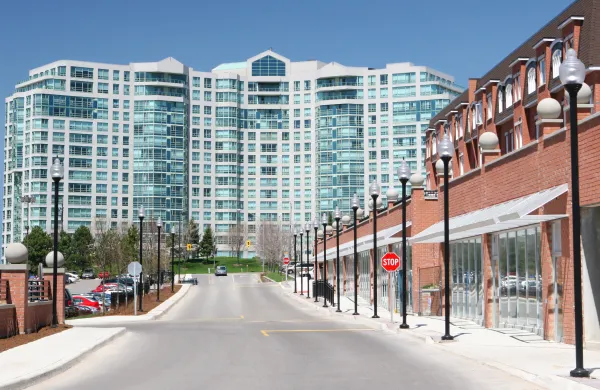When Albrecht Schmidt, CEO of Bayerische Vereinsbank, and Eberhard Martini, his counterpart at Bayerische Hypotheken- und Wechsel-Bank, boasted in 1997 that the merger of their regional lenders would create an international bank to make southern Germans proud, they had no idea how right -- and how wrong -- they would turn out to be.
The deal created HVB Group, Germany's second-largest bank by assets but one that failed to live up to its promise until it was taken over by Italy's UniCredit last year (Institutional Investor, July 2005). A little-known HVB spin-off, Hypo Real Estate Holding, has managed to thrive, however, despite inheriting some of its parents' worst assets. A commercial real estate specialist, Hypo was the toxic-waste dump for about E5 billion ($5.9 billion) of nonperforming and subperforming property loans -- fully 13 percent of its mortgage portfolio -- mostly made in the early 1990s in an ill-fated bet that the toppling of the Berlin Wall would trigger a real estate boom in the former East Germany. Most press announcements of Hypo's October 2003 birth read like obituaries.
Hypo Real Estate has defied the odds and the pundits. Today the bank is a solid niche player financing commercial real estate deals around the world, with a market capitalization of E7.4 billion. Pretax income nearly doubled, to E408 million, in 2005, according to preliminary figures, from E221 million in 2004. Hypo's shares have nearly quadrupled since the bank was spun off.
So it was symbolic, and not a little ironic, when on December 16, Hypo Real Estate replaced the no-longer-German-owned HVB in the DAX 30 index of Germany's biggest companies.
"They started with what looked like a dull bank," says Dirk Becker, an analyst for Kepler Equities in Frankfurt. "Now it is the most exciting in Germany."
Still, that impressive performance hasn't satisfied the ambitions of Hypo's chief executive, Georg Funke, 50, a tall, dark-haired, disciplined Bavarian. Hypo Real Estate is aiming for an aftertax return on equity of 11 to 12 percent by 2007; ROE was 7.7 percent in the first nine months of 2005, the last period for which full results are available, up from 4.0 percent in the same period a year earlier. "We are not quite where we want to be," Funke tells Institutional Investor. "But we are well on the way."
International lending is the bank's driver, and the CEO intends to expand rapidly in Asia. Hypo already has offices in Hong Kong, Singapore and Tokyo, and the bank is set to open an office in India this year. Funke is also finding growth at home: Domestic real estate lending, once such a money-losing proposition that Hypo stopped making new loans in Germany, is again contributing to the left side of the balance sheet.
More controversially, Funke (pronounced FUHNK-uh) is steering Hypo into public sector financing, a new line that diversifies the bank's product range to compete with that of its larger German rival Eurohypo. Commerzbank recently bought out its two partners in Eurohypo, Deutsche Bank and Allianz, and plans to build the franchise. That is just one challenge Hypo faces.
FUNKE DESCRIBES HIMSELF ONLY HALF JOKINGLY as "nervous," and heaven knows he had every reason to be when HVB hived off Hypo Real Estate to its shareholders. Those shareholders didn't give the new bank much chance of survival, let alone success. They were offered one share of Hypo for every four shares of HVB they owned, and most promptly unloaded the stock.
But then, German investors had been burned by the country's real estate bust in the 1990s. Four days before Hypo's October 6, 2003, listing on the Frankfurt Stock Exchange, Munich Re Group announced that it had sold its 25.7 percent stake, explaining that it wanted to "remove uncertainty" in the markets. The big insurer booked a E258 million loss on the sale. (Had Munich Re held on to its shares, they would be worth about E1.9 billion today.)
Funke had faith in Hypo from the start. As a member of the managing board of HVB Real Estate Bank, as the unit was then known, he had caught wind of the move by HVB directors to spin off the division. So he volunteered -- a sign of how hazardous the mission was thought to be -- to become the new bank's first chief executive. (He edged out the head of HVB Real Estate Bank, Claus Nolting, who opposed the spin-off and left HVB in 2003.)
Funke had a solid background in real estate lending. He had been co-head of the U.K. branch of Bayerische Hypotheken and in 1998, after the creation of HVB, was asked to lead the British arm of the new bank's real estate financing unit. Two years later Funke moved his British wife and his daughter to Munich to take over HVB's international real estate division. That job primed him to run Hypo Real Estate.
"If you are just involved in one economy and have just one real estate book, then in a recession you really struggle," the banker tells II in an interview in his stark-white, ultramodern office in Munich. "You need a different product mix, yes, but more important, you have to have a regional mix so that one individual economy can't hold you down."
The first thing Funke did as CEO was to set up a holding company to oversee the group's three distinct businesses: international real estate lending, German commercial real estate and domestic mortgage specialist Württembergische Hypothekenbank.
"German entities sometimes have a problem with a lack of transparency," Funke says. "We needed investors' trust in a very short period. We needed to show them what the facts were and what we are doing. I felt that very clearly."
Then Funke moved to restructure the German unit. He and Frank Lamby, the manager of the division, adopted draconian methods: They effectively stopped making new loans in Germany and concentrated on improving margins on the existing loan book and working off bad debts.
"I have seen the same mistake happen too often," says Funke. Banks "write more business, become more and more aggressive in their new business, just to pay for the losses in the end. We didn't want to do that."
Next he sought out Karsten von Köller, an old friend and former chairman of the management board of Eurohypo who was CEO of Lone Star Germany, an arm of the U.S. private equity firm, which specializes in distressed debt. Less than two months after Hypo's shares began trading, the bank sold Lone Star E500 million in nonperforming loans -- the first German bank to do anything so brash. The transaction was so successful that the two sides negotiated a deal for Lone Star to buy most of Hypo's remaining nonperforming and subperforming loans, worth E3.6 billion.
The announcement of that deal in September 2004 made headlines throughout Germany. It was by far the biggest sale of distressed loans that anyone in the country had attempted. More important to Hypo, the sale slashed the bank's portfolio of distressed debt by 75 percent in a single stroke. "The disposal let us concentrate on our new business, whereas a workout of these loans would have tied us up for much longer," Funke explains.
The CEO also identified geographic diversification as the key to his bank's salvation. Hypo's international finance operation extended E15.1 billion in new loans in 2005, far surpassing its target of E10 billion. The international unit accounted for two thirds of the bank's overall new lending of E22.3 billion last year.
Return on equity for the international operation is a sound 12.3 percent; the cost-to-income ratio, an impressive 28.2 percent. The largest share of the international unit's real estate portfolio -- 26 percent -- is in the U.K. Other big exposures are in the U.S. (24 percent), France (15 percent), Scandinavia (9 percent) and Spain (7 percent).
The efforts haven't gone unnoticed by onetime skeptics. "Hypo Real Estate cleaned up its loan books, always achieved its targets and is on its way to delivering its ROE targets," says Britta Schmidt, an analyst at Fox-Pitt, Kelton in London. "It has never really failed. Funke is addressing all the issues."
In contrast to Funke's activism, HVB has continued to write low-margin business at home even as it has built a growing bank network in Eastern Europe. HVB has been much slower to unload its E15.4 billion in sub- and nonperforming loans: To date it has eliminated only about half of that amount.
FUNKE HAS SPECIAL REASON TO FEEL SATISFIED with the international business: He had to lobby strenuously with HVB to secure it for the spin-off. Initially, the big bank, under pressure from shareholders and regulators to reduce risky assets, planned to hive off only its domestic real estate business. Says one former HVB executive, "Funke knew that the international business was the biggest profit center for HVB, and he wanted it as part of the [new] bank."
It took some persuasion, however, says the former executive. Given that HVB's managers had decided to focus on retail banking, Funke reportedly told them it was logical to let him have international real estate. He argued that the international unit's managers, mostly based in London, wouldn't stay if they knew their business was no longer a core operation at HVB. Funke also told the HVB bankers that giving Hypo the international business was the only way to ensure the new bank's success.
"It was in the interests of HVB to create a healthy spin-off, and to create a healthy spin-off, the international business was very crucial," he tells II.
In hindsight, observes analyst Becker, giving up international "was a remarkably bad idea for HVB. It deteriorated capital ratios, deprived them of a profit center and robbed them of talented managers."
Hypo signaled its international bent from the outset. Right after the spin-off Funke put the headquarters of Hypo's international operation in Dublin. The bank had inherited an Irish banking license from HVB, and Dublin offered low taxes and a burgeoning market for covered bonds, collateralized securities similar to German Pfandbriefe.
At the start of this year, however, Funke relocated the international operation to Stuttgart and merged it with Hypo's mortgage specialist there, Württembergische Hypothekenbank. The move takes advantage of a German law that took force in July 2005, liberalizing the issuance of Pfandbriefe.
Pfandbriefe, which are bonds collateralized by such long-term assets as mortgages and public sector loans, have survived the Napoleonic wars, two world wars and the collapse of the Berlin Wall with no known defaults. That stellar history makes them popular with investors -- and a cheap source of finance for issuers. Hypo managers calculate that WürttHyp's triple-A rating enables it to issue Pfandbriefe at a good 10 basis points below the cost of issuing covered bonds in Dublin. By merging the two operations, Funke aims to use that funding advantage to fuel the bank's international growth and to generate savings by refinancing the bank's E20 billion portfolio of older loans.
The merged entity, Hypo Real Estate Bank International, has a real estate portfolio of E29.3 billion. It earned a net interest margin of 140 basis points on new lending last year. By offering a full range of products from a single platform, Funke estimates the bank can save E25 million a year. He also believes the merger will lower the bank's risk profile by fostering a greater international diversification of its portfolio.
The Dublin operation, renamed Hypo Public Finance Bank, will shift its focus to lending for public sector infrastructure projects and securities trading. It has a modest capital of E200 million. Nevertheless, analyst Becker says he worries that the Dublin business will distract Hypo from its core competence: financing real estate.
Notwithstanding Hypo's focus on international expansion, Funke hasn't written off the domestic real estate business. After selling the bulk of the bank's distressed loans to Lone Star, Funke and German general manager Lamby turned their attention to improving the profitability of the remaining assets. They focused on repricing loans that came up for renewal. "We said, 'We either get the margin we feel is right for that specific loan, or the customer has to repay us,'" says Funke.
Interestingly, about half of the bank's customers paid the higher margins. Thus Hypo last year was able to reap average margins of 150 basis points over its cost of funds for new long-term loans and 130 basis points, on average, for all new credits, short and long. That compares with an average margin of less than 50 basis points at the time of the spin-off. The German unit has a margin of 63 basis points on its E31 billion portfolio; Lamby's goal is to raise that to 100 basis points by 2008.
In a sure sign that Hypo is back in business in Germany, the bank provided financing in November for CommerzLeasing und Immobilien Gruppe's E1.1 billion purchase of properties from the state government of Hesse.
Does Funke have any reservations about returning to the market that so badly burned HVB? "Not at all," he says. "Germany is still the biggest European economy." He's quick to add, though, that Hypo's aspirations have their limits. "Will we be No. 1 in balance-sheet size? No. Profitability? Yes. Market cap? That's important too."
Germany is important to Hypo for the same reason that the bank chose to expand beyond its borders: diversification within an increasingly global portfolio. Funke tells a story to illustrate how critical this principle has become.
In 2000, HVB Real Estate, then his charge, had $1.8 billion in financing tied up in San Francisco office space renting for $90 per square foot. Three years and one dot-com bust later -- just when Hypo was being spun off -- rents in the city had fallen to $75 per square foot. So Hypo compensated for San Francisco's cybertroubles by stepping up business elsewhere in the U.S., notably in New York. Among other deals, the bank in 2004 provided a Macklowe Properties affiliate with $175 million to refinance Two Grand Central Tower, an office building in midtown Manhattan.
Was Funke ever nervous about the San Francisco situation? "Of course I was nervous," he laughs. "I'm a banker. I'm always nervous until I get my money back. We got it all back, so it is all in order. But I am a very nervous person."
That attitude should help Hypo Real Estate's investors stay more relaxed.





